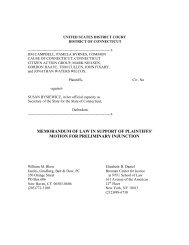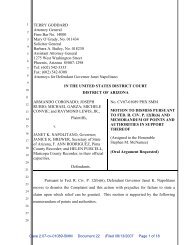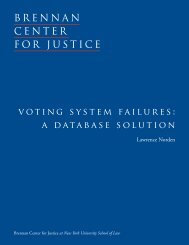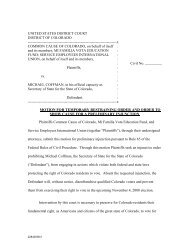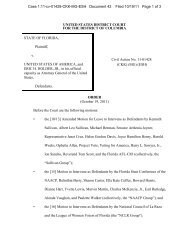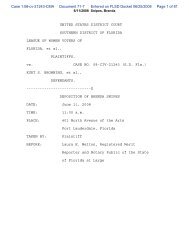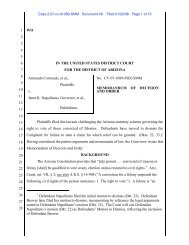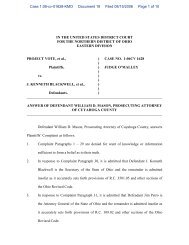1437 Bannock St . Denver , Colorado 80202 - Brennan Center for ...
1437 Bannock St . Denver , Colorado 80202 - Brennan Center for ...
1437 Bannock St . Denver , Colorado 80202 - Brennan Center for ...
Create successful ePaper yourself
Turn your PDF publications into a flip-book with our unique Google optimized e-Paper software.
As subordinate officials, county election officers cannot disobey or disregard a rule, orderor interpretation of law proffered by the Secretary. “It is well established that as a general rule,neither a county officer nor a subordinate county agency has any standing or legal authority toquestion or obtain judicial review of an action taken by a superior state agency.” Lamm v.Barber, 192 Colo. 511, 519, 565 P.2d 538, 544 (1977). When a statute imposes upon asubordinate county officer a legal obligation to comply with a rule or order of a state official, thesubordinate official must comply with the rule or order, even if the county officer believes thatthe order is unconstitutional or inconsistent with statute.The Lamm case is dispositive. The <strong>St</strong>ate Board of Equalization (SBOE) sued three countyassessors who refused to comply with an SBOE order. The orders were authorized by statestatutes. One statute provided that the assessor “shall <strong>for</strong>thwith make the necessary changes inthe abstract of assessment required to carry out such order” requiring a correction of assessment.Section 39-5-127, C.R.S. (1973). A second statute provided that assessors, upon receipt of anorder from SBOE, “shall <strong>for</strong>thwith make the proper adjustment in each individual scheduledaffected by such order so that the assessment roll of his county.” Section 39-9-107, C.R.S.(1973).The assessors argued that they had the right to challenge the validity of the SBOE orders.The Court unequivocally rejected the assessors’ argument:The respondents are incorrect. Their argument is a house of cardsresting on the assumption that they have discretion to follow ordisregard the <strong>St</strong>ate Board’s order. While it is true that they havediscretion to determine the details of how they will implement the<strong>St</strong>ate Board ordered increases, they have no discretion to determinewhether or not to implement them. Each respondent has a clearlegal duty to carry out the <strong>St</strong>ate Board’s order by increasing theaggregate valuation of certain subclasses of property within his12



![Download the Letter [PDF] - Brennan Center for Justice](https://img.yumpu.com/50139248/1/190x245/download-the-letter-pdf-brennan-center-for-justice.jpg?quality=85)

